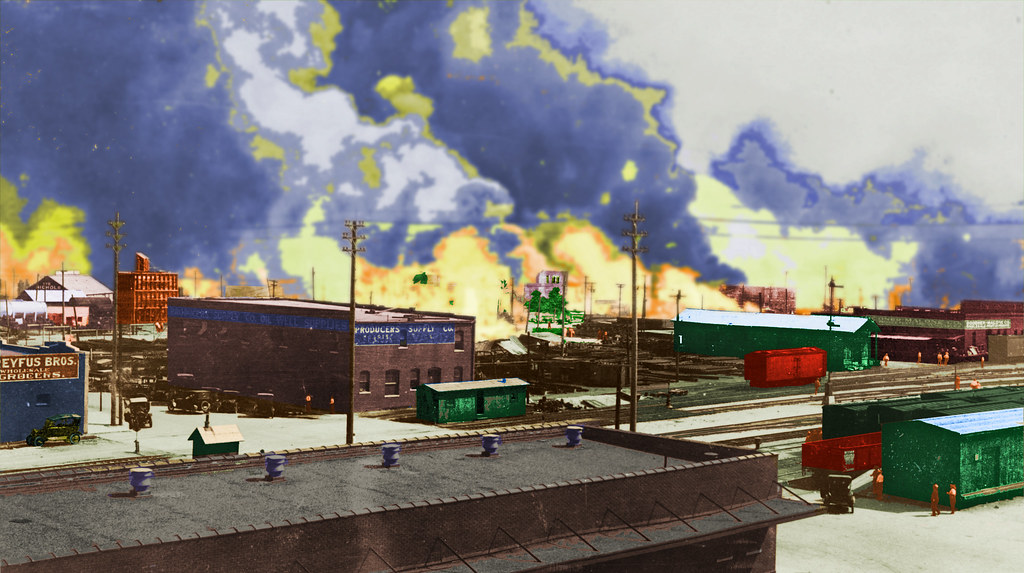One hundred years ago today, white Tulsa citizens stormed into the Greenwood district of Tulsa and began attacking Black citizens. Like many incidents like these throughout American history, it started when a Black man was accused of doing something to a white girl/woman. I say "something," because it's still unclear what happened on the elevator where the "something" allegedly happened.
One hundred years ago today, the Tulsa Massacre began. It would end only a day later (fortunately just one day because it could’ve been much worse had it lasted longer) once the National Guard was called in, but after hundreds of Black people had been injured, thousands of Black people made homeless due to their homes be burned and destroyed, and an untold number of Black people killed. Untold numbers. Hmm.
Some estimates say as high as 300 people were killed. Some records seriously lowball that number, but it's hard to do an accurate counting of the dead when their killers dumped many in of the dead in mass graves and damn near any local newspapers about the massacre were scrubbed of related news (like the elevator incident) OR it simply wasn't reported about at the local, state, or even national level. A whole ass massacre--NOT reported. Where dey do that at? We know quite well where. These United States, and elsewhere.
This area of Tulsa has been known as Black Wall Street, and this tragedy is one that many Black families pass down through oral traditions, but it has just recently gained national (read: white folks) attention in the last few years, thanks largely to HBO's Watchmen series. Damn shame it takes a fictitious show to teach tons of folks about history, but that’s another trait of these United States.
For Black families, this tragedy is often framed as "we were successful, self-sufficient, and thriving. Owned businesses. Had our own shit. We had Black Wall Street. We had Rosewood, but there's nothing that a poor white man hates more than a successful, thriving Black man." I don't know that hatred can be boiled down into such simplistic terms, but I DO know white vigilantes defending the “honor” of “innocent” white women ran up in several Black towns or Black parts of town and destroyed, killed, burned, looted Black lives many times in these United States.
These are lessons of survival that were handed down. Things like Red Summer of 1919, Emmett Till, Elaine, Arkansas, and Black Wall Street are referenced in passing and/or hushed tones until the grown folks think you're old enough to understand. And as a Black mother who now has to pass along the stories of beautiful successes followed by tragic pain, I can guarandamntee you, the kids are NEVER as old as you want them to be before you have to begin to explain this mess. My oldest kid was 5 when we first had to begin explaining racial shit to them. Neither of my kids had hit their teens, and one wasn't even in double digits, last summer when we had to watch the news coverage of George Floyd's tragic, entirely preventable murder and the much-needed protests worldwide that followed. I sobbed as I heard my spouse explaining what they were watching to the kids.
Sobbed because I felt the youngest was damn sure too young to have to come face to face with “why are they killing us.”
Sobbed because I wanted to preserve their innocence just a little longer.
Sobbed because all we can do is equip them with these horrible lessons, try to tell them the tips and tricks to survive and pray to all the gods and goddesses their ever were that they always make it home safely and make it to old age and get to pass peacefully in their sleep--a sweet, simple death that too many Black folks have been denied in these United States.
So, here we are one hundred years after the start of the Tulsa Massacre.
Here we are, still passing along these historical lessons ourselves, largely because the school systems aren't going to.
Here we are, still filling in the gaps of our history with our children--no different from what generations of Black families and other families of color have done.
And while I'm thankful for video resources to aid in my passing the knowledge along, I'm still annoyed that we still have to. Some teachers, schools, and school systems have gotten moderately better--Oklahoma now requires lessons on the Tulsa Massacre--but others are digging in deeper about not teaching any of the horrors of the racist, hateful past in these United States. So here we are, one hundred years after the Tulsa Massacre, passing along the lessons, so hopefully, our children aren’t doomed and damned to repeat or die from the tragedies of the past.
So here we are, one years after Tulsa. What lessons are you passing along?
Colorized image from the Tulsa Race Riot.
The major fire in the center behind the Producers Supply Company is the Midway Hotel in flames. The building behind it that you can see is the Gurley Building burning. The flames to the right are from the Williams Building. The as yet unburned building behind the building behind the red train car is the Woods building at the corner of Greenwood and Archer. Based on shadows this was taken about 8 in the morning.
Original photographer is unknown.
Original photo is 1989-004-5-28, McFarlin Library. Department of Special Collections and University Archives. The University of Tulsa (cdm15887.contentdm.oclc.org/cdm/singleitem/collection/p15...). Used with permission.

Comments
Post a Comment